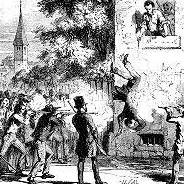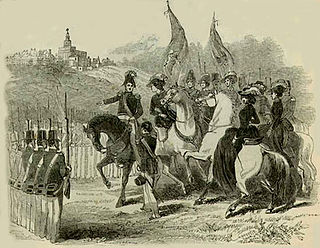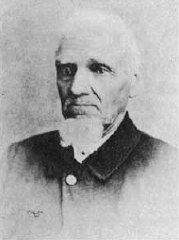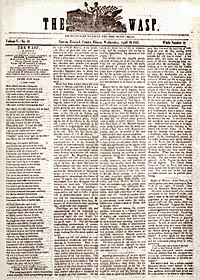The Anti-Mormon Party was a short-lived political party in Illinois in the early 1840s that espoused Anti-Mormonism. The party was formed in Hancock County to oppose the political power Joseph Smith held in Nauvoo, Illinois, as the mayor of the city, head of the Nauvoo Legion, and prophet to the city's Latter Day Saint residents.

Illinois is a state in the Midwestern region of the United States. It has the 5th largest Gross Domestic Product by state, is the 6th-most populous U.S. state and 25th-largest state in terms of land area. Illinois is often noted as a microcosm of the entire United States. With Chicago in the northeast, small industrial cities and great agricultural productivity in northern and central Illinois, and natural resources such as coal, timber, and petroleum in the south, Illinois has a diverse economic base, and is a major transportation hub. Chicagoland, Chicago's metropolitan area, contains over 65% of the state's population. The Port of Chicago connects the state to other global ports around the world from the Great Lakes, via the Saint Lawrence Seaway, to the Atlantic Ocean; as well as the Great Lakes to the Mississippi River, via the Illinois Waterway on the Illinois River. The Mississippi River, the Ohio River, and the Wabash River form parts of the boundaries of Illinois. For decades, Chicago's O'Hare International Airport has been ranked as one of the world's busiest airports. Illinois has long had a reputation as a bellwether both in social and cultural terms and, through the 1980s, in politics.

Anti-Mormonism is discrimination, persecution, hostility or prejudice directed against the Latter Day Saint movement, particularly The Church of Jesus Christ of Latter-day Saints. The term is often used to describe persons or literature that are critical of their adherents, institutions, or beliefs, or physical attacks against specific Saints or the Latter Day Saint movement as a whole.

Hancock County is a county in the U.S. state of Illinois. According to the 2010 census, it has a population of 19,104. Its county seat is Carthage, and its largest city is Hamilton. The county is made up of rural towns with many farmers.
The party was organized in July 1841 by Thomas C. Sharp, editor of the Warsaw Signal . [1] The June 23 edition of the Warsaw Signal printed a report that delegates had been elected to the "Anti-Mormon Convention" that was to be held on June 28. The meeting also resolved "[t]hat it is expedient to hold a county convention, for the purpose of nominating candidates for the offices of School and County Commissioners, in opposition to Mormon influence and dictation." [2]

Thomas Coke Sharp was a prominent opponent of Joseph Smith and the Latter Day Saints in Illinois in the 1840s. Sharp promoted his anti-Mormon views largely through the Warsaw Signal newspaper, of which he was the owner, editor, and publisher. Sharp was one of five defendants tried and acquitted of the murders of Smith and his brother Hyrum.

The Warsaw Signal was a newspaper edited and published in Warsaw, Illinois during the 1840s and early 1850s. For most of its history, the Signal's editorial stance was one of vigorous anti-Mormonism and the advancement of the policies of the Whig Party.
In 1841, the party nominated Richard Wilton for Hancock County School Commissioner and Robert Miller for County Commissioner. [3] Neither candidate was elected in the August 1841 elections. By 1844, the party was being referred to as the "Central Anti-Mormon Committee" of Hancock County; the committee was led by Sharp, William N. Grover, and Henry Stephens. [4]
William N. Grover was a United States Attorney for the eastern district of Missouri. He was one of five defendants tried and acquitted in Illinois for the murder in 1844 of Joseph Smith, founder of the Latter Day Saint movement.
The party continued its existence until it gradually died out after June 1844, when Joseph Smith was killed by an armed mob and the majority of Latter Day Saints subsequently made it known that they intended on leaving Illinois. The five men who were tried and acquitted of murdering Smith—Sharp, Grover, Mark Aldrich, Jacob C. Davis, and Levi Williams—were all members of the Anti-Mormon Party.

Joseph Smith, the founder and leader of the Latter Day Saint movement, and his brother Hyrum Smith were killed by a mob in Carthage, Illinois, on June 27, 1844. The brothers had been in jail awaiting trial when an armed mob of about 200 men stormed the facility, their faces painted black with wet gunpowder. Hyrum was killed first, having been shot in the face. As he fell, Hyrum shouted, "I'm a dead man, Joseph!" After emptying the pistol with which he tried to defend himself, Joseph was then shot several times while trying to escape from a second-story window and fell from that window as he died.

Mark Aldrich was a founder of Warsaw, Illinois, and a politician: Illinois state senator for the Whig Party, the first American mayor of Tucson, Arizona, and a three-term territorial senator in Arizona. He was one of five defendants tried and acquitted in Illinois of the murder in 1844 of Joseph Smith, who was founder of the Latter Day Saint movement.
Jacob Cunningham Davis was a politician, a U.S. Representative from Illinois. He was one of five men tried and acquitted in Illinois of the murder in 1844 of Joseph Smith, founder of the Latter Day Saint movement.








